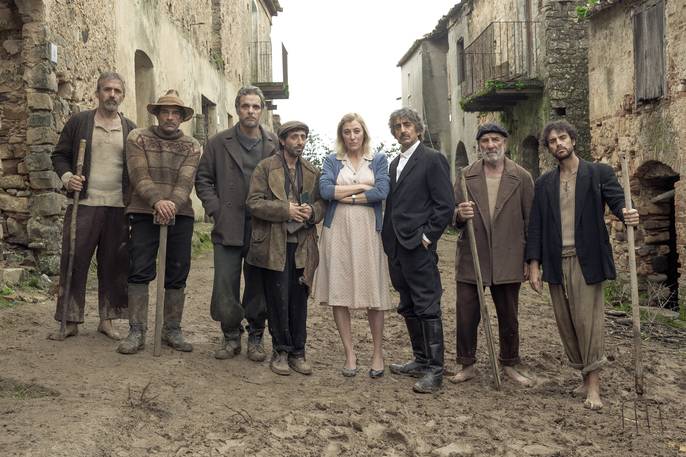


Presented at the Taormina Film Festival [2] and premiering in Italian theatres on October 17th, Mimmo Caloprsti’s film is set in Africo, a small town in the heart of Aspromonte, where Pietro Criaco, the author of the novel that inspired the movie, (“Via dall’Aspromonte”, Rubbettino Editions) was born.
The “ultimi” (which literally translates to 'last ones' though the title was translated into 'The Land of the Forgotten') mentioned in the title are the inhabitants of a town that has always lived in isolation. Old Africo, destroyed by the 1951 flood, today consists of a cluster of ruins gathered around the beautiful San Leo Monastery. “The South has always been a geographic and spiritual place. Heaven and Hell, fairy tale and tragedy,” director Mimmo Calopresti explains. “And so is this film.”
The story is set in the 1950s, there is no electricity and not even one connecting road. In Africo, institutions are absent, here, everything feels suspended, in limbo. There is a complete lack of collective interest in a place that actually has a deep desire for redemption. In the film, we see inhabitants who are exasperated by the general indifference they face, and after yet another woman dies during childbirth because the doctor couldn’t make it in time, decide to pave the road their own hands and open up a path towards the future.
This journey also sees the involvement of elementary school children. Their teacher, Giulia, (Valeria Bruni Tedeschi [3]) wants to teach them Italian so that when the road will be complete they will be ready to enter the new world.
“I left my small Calabrian town when I was very young and now I need to go back to my origins,” continued the director, who is originally from Polistena, in the province of Reggio Calabria. “When I began filming I thought I was making a timeless film. Then I understood that Africo is the capital of the world, it is today.”
The movie is a story of civil disobedience. The Africotans, lead by Peppe, (Francesco Colella) will have to face Don Totò, (Sergio Rubini) a sort of farmer/mafia boss, who makes the law and doesn’t let anything question his power over the community.
Historical shots recreate a universe that operated on the margins of the margins, detached, far from any axis, a town thought of a cursed, plagued by misery, and long-ruled by the ‘ndrangheta. (the Calabrian mafia, ed.) In one scene, the director recreates the arrival of journalists from the North sent down to document this complex and incomprehensible reality, the way of life of a long-forgotten people.
After the floods of the 1950s, Africo was fully evacuated. Only later did they discover that the center could have been rebuilt where it once stood or in its immediate vicinity. The town became a symbol of civil and human abandonment by the national community. The same happens today.
“Africo is in Europe and it reminds us of what, just one century ago, our country could be,” Calopresti explains, “but, the Italian South, its dreams and its defeats, more so than our continent, resembles all those places that are left to die in order to better pillage them of their natural resources. The “ultimi” today are numerous and they need to exist. They are alive, still present, still desperately in search of a future, at the doors of Europe.”
Source URL: http://test.iitaly.org/magazine/focus/art-culture/article/aspromonte-land-forgotten
Links
[1] http://test.iitaly.org/file/112267
[2] https://www.taorminafilmfest.it/
[3] https://en.wikipedia.org/wiki/Valeria_Bruni_Tedeschi